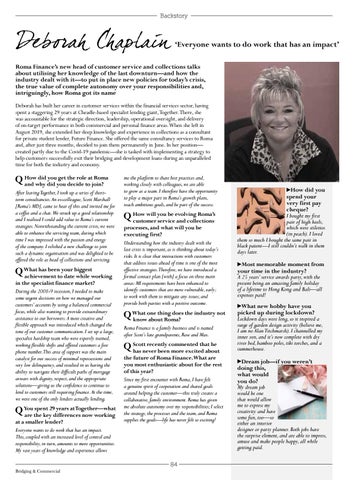Backstory
‘Everyone wants to do work that has an impact’ Roma Finance’s new head of customer service and collections talks about utilising her knowledge of the last downturn—and how the industry dealt with it—to put in place new policies for today’s crisis, the true value of complete autonomy over your responsibilities and, intriguingly, how Roma got its name Deborah has built her career in customer services within the financial services sector, having spent a staggering 29 years at Cheadle-based specialist lending giant, Together. There, she was accountable for the strategic direction, leadership, operational oversight, and delivery of on-target performance in both commercial and personal finance areas. When she left in August 2019, she extended her deep knowledge and experience in collections as a consultant for private student lender, Future Finance. She offered the same consultancy services to Roma and, after just three months, decided to join them permanently in June. In her position— created partly due to the Covid-19 pandemic—she is tasked with implementing a strategy to help customers successfully exit their bridging and development loans during an unparalleled time for both the industry and economy. How did you get the role at Roma and why did you decide to join? After leaving Together, I took up a series of shortterm consultancies. An ex-colleague, Scott Marshall [Roma’s MD], came to hear of this and invited me for a coffee and a chat. We struck up a good relationship and I realised I could add value to Roma’s current strategies. Notwithstanding the current crisis, we were able to enhance the servicing team, during which time I was impressed with the passion and energy of the company. I relished a new challenge to join such a dynamic organisation and was delighted to be offered the role as head of collections and servicing. What has been your biggest achievement to date while working in the specialist finance market? During the 2008-9 recession, I needed to make some urgent decisions on how we managed our customers’ accounts by using a balanced commercial focus, while also wanting to provide extraordinary assistance to our borrowers. A more creative and flexible approach was introduced which changed the tone of our customer communication. I set up a large, specialist hardship team who were expertly trained, working flexible shifts and offered customers a free phone number.This area of support was the main catalyst for our success of minimal repossessions and very low delinquency, and resulted in us having the ability to navigate their difficult paths of mortgage arrears with dignity, respect, and the appropriate solutions—giving us the confidence to continue to lend to customers still requiring finance. At the time, we were one of the only lenders actually lending. You spent 29 years at Together—what are the key differences now working at a smaller lender? Everyone wants to do work that has an impact. This, coupled with an increased level of control and responsibility, in turn, amounts to more opportunities. My vast years of knowledge and experience allows
me the platform to share best practices and, working closely with colleagues, we are able to grow as a team. I therefore have the opportunity to play a major part in Roma’s growth plans, reach ambitious goals, and be part of the success. How will you be evolving Roma’s customer service and collections processes, and what will you be executing first? Understanding how the industry dealt with the last crisis is important, as is thinking about today’s risks. It is clear that interactions with customers that address issues ahead of time is one of the most effective strategies.Therefore, we have introduced a formal contact plan [with] a focus on three main areas: MI requirements have been enhanced to identify customers that are more vulnerable, early; to work with them to mitigate any issues; and provide both parties with a positive outcome. What one thing does the industry not know about Roma? Roma Finance is a family business and is named after Scott’s late grandparents, Rose and Max. Scott recently commented that he has never been more excited about the future of Roma Finance. What are you most enthusiastic about for the rest of this year? Since my first encounter with Roma, I have felt a genuine spirit of cooperation and shared goals around helping the customer—this truly creates a collaborative, family environment. Roma has given me absolute autonomy over my responsibilities; I select the strategy, the processes and the team, and Roma supplies the goals—life has never felt so exciting!
84 Bridging & Commercial
How did you spend your very first pay cheque? I bought my first pair of high heels, which were stilettos (in peach). I loved them so much I bought the same pair in black patent—I still couldn’t walk in them days later. Most memorable moment from your time in the industry? A 25 years’ service awards party, with the present being an amazing family holiday of a lifetime to Hong Kong and Bali—all expenses paid! What new hobby have you picked up during lockdown? Lockdown days were long, so it inspired a surge of garden design activity (believe me, I am no Alan Titchmarsh). I channelled my inner zen, and it’s now complete with dry river bed, bamboo poles, tiki torches, and a summerhouse. Dream job—if you weren’t doing this, what would you do? My dream job would be one that would allow me to express my creativity and have some fun, too—so either an interior designer or party planner. Both jobs have the surprise element, and are able to impress, amuse and make people happy, all while getting paid.
